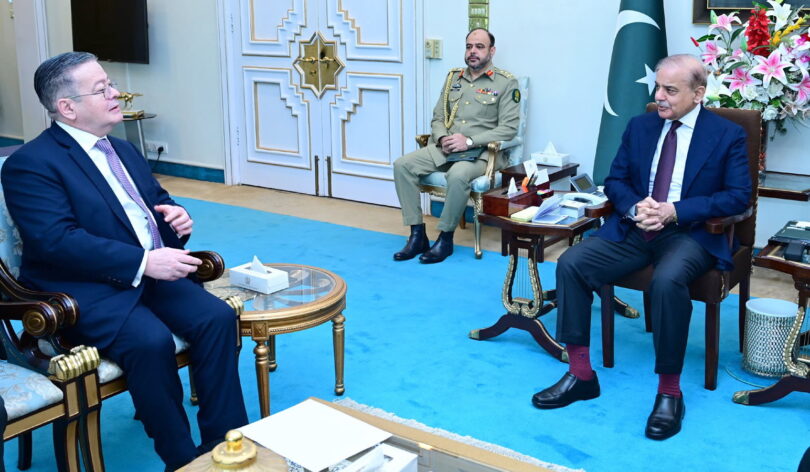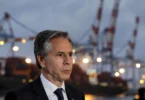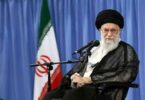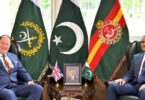F.P. Report
ISLAMABAD: Prime Minister Shehbaz Sharif on Wednesday stressed the need for working together to enhance cooperation between Pakistan and France, particularly in the areas of trade and investment.
The prime minister, in a meeting with Ambassador of France in Islamabad Nicolas Galey who paid a courtesy call on him, invited the French companies to invest in Pakistan. He welcomed the initiative of the French side to bring corporate leaders from top French companies on a visit to Pakistan soon.
The prime minister, who was accompanied by Foreign Minister Senator Muhammad Ishaq Dar, and SAPM Tariq Fatemi, also shared that stabilization of the economy was on top of the government’s agenda. The ambassador handed over a congratulatory letter from French Prime Minister Gabriel Attal, addressed to Prime Minister Shehbaz on his re-election.
The prime minister thanked the French leadership for the message of greetings. He said that Pakistan enjoyed friendly and cordial ties with France and, although the relationship had undergone a difficult phase a few years ago, the two countries were now working together to further strengthen bilateral cooperation.
Prime Minister Shehbaz fondly recalled his numerous interactions with French President Emmanuel Macron, in particular their meetings on the sidelines of UNGA Session in 2022, as well as on the margins of the Paris Conference on New Financing Pact on Climate Change in June 2023. He also lauded President Macron’s valuable contribution through virtual participation at the Geneva Conference on Resilient Pakistan in January 2023.
The prime minister reiterated his invitation to President Macron to undertake an official visit to Pakistan, at his earliest convenience. The situation in Gaza was also discussed in the meeting and the prime minister appreciated French peace efforts in the region. The situation in Afghanistan was also discussed.
The French ambassador thanked Prime Minister Shehbaz for receiving him and briefed him on the latest developments on the bilateral front. He said a French delegation was expected to visit Pakistan for discussions on bilateral cooperation. In addition to strengthening of bilateral ties, he said France was keen to work closely with Pakistan in multilateral forums, including the United Nations.
Meanwhile, the Prime Minister Shehbaz Sharif said that new initiatives to attract and retain top talent would be rolled out to secure Pakistan’s success and stressed that Pakistan must build a world-class talent pool because this was an age where talent made all the difference to a nation’s success.
The prime minister chaired a meeting regarding the induction of technical advisors and consultants from the private sector into public sector, PM Office Media Wing said in a press release. Federal Ministers Muhammad Aurangzeb, Dr. Musadiq Malik, Ahad Cheema, Attaullah Tarar, Sardar Awais Leghari, Deputy Chairman Planning Commission Muhammad Jehanzeb, Minister of State Shaza Fatima and high-level officials attended the meeting.
The meeting discussed ways to create a more capable workforce that could be able to deliver the government’s policy programme effectively, and also founded on the principles of impartiality and recruitment on merit. The prime minister noted that the need to focus on attracting and retaining top talent was as urgent and as important as their focus on investments in the country. “Businesses want to invest in places where the talent is; where the politics and policies are stable, and where the system works”, he added.
He also appointed a committee under the chairmanship of finance minister to seek and firm up propositions in the policy to enhance and clarify the work pass framework currently in vogue in ministries to better support Pakistan’s need for talent with the directions to submit its findings at the earliest. The meeting noted a dearth of technical input at policy making levels and emphasized its need, which was imperative if the civil service was to develop new skills, improve its management of big projects and adapt to the demands of a digital age. The participants of the meeting highlighted barriers to appointing people from outside such as long timescales, processes that prevented a proper search for the best candidates and pay inflexibility that made it all difficult to attract the best talent, particularly in areas of skills shortages.







